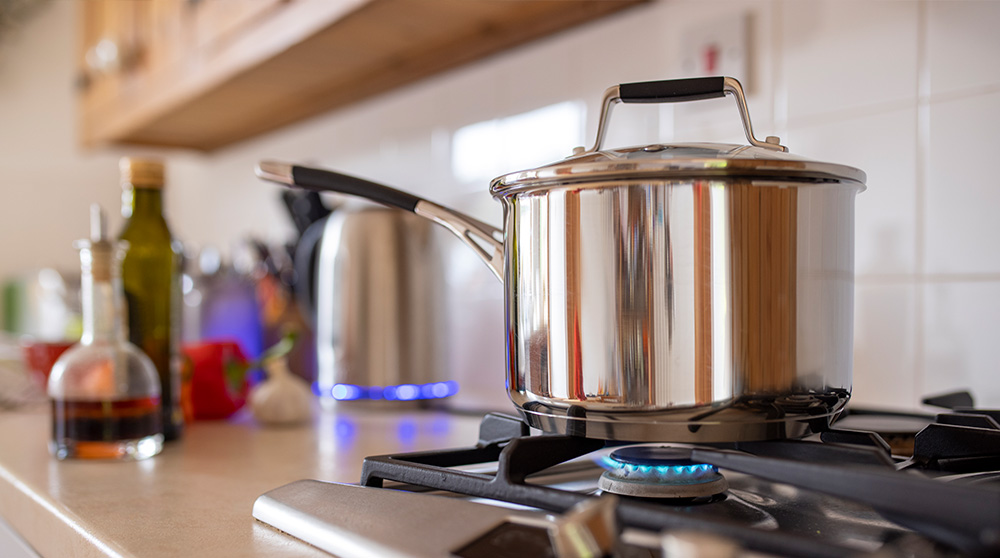14 fire hazards in your home.

You know the obvious fire hazards in your home, like your stove or space heater. But can you spot the lesser-known risks? Because house fires can happen in any room of your home (at any point in the day or night), it’s essential that you’re prepared. Our experts gathered 14 common fire hazards in the home to help you take preventive action now.
Add protection and peace of mind by exploring 14 fire hazards in the home and how you can prevent them.
Ovens and stoves. Cooking-related events are a leading cause of home fires … especially when appliances like the oven or stove are involved. Always stay in the kitchen when you’re cooking. If something is in the oven, don’t leave the house. If something is on the stove, clear away items like dish towels or oven mitts that could catch fire. Clean both your oven and stovetop frequently so greases and oils don’t build up and lead to flames.
Toasters. While today’s toasters come with anti-jam and automatic shutoff functions, they can fail if they’re not in working order. When you’re not using a toaster, unplug it. Because toasters can also give off excess heat, it is best to place them away from upper cabinetry while in use. On top of that, regularly clean the toaster by removing old crumbs that could easily spark.
Microwaves. Make sure everyone in your household is aware of the things that can’t go in the microwave, like aluminum foil, utensils, items with metal or stainless steel, Styrofoam, and other fire hazards. Additionally, if you’re shopping for a new microwave, look for one with the label of an independent testing laboratory. That way, when you complete and return the product registration card, the manufacturer can reach you if there’s a recall you should know about.
Dishwashers. Every dishwasher goes through a cycle of heating up and cooling down, and it can catch fire if something goes wrong during one of these steps. It may seem harmless to turn on the dishwasher before you leave the house or go to bed, but it’s better to run a cycle when you’re close by to keep an eye on it.
Electric blankets. Heating pads and electric blankets cause around 500 home fires each year. Never plug heated covers into an extension cord and always be awake and alert while you’re using them. Purchase the items only from reputable retailers with products that have been tested and approved for safety.
Space heaters. Space heaters lead to 25,000 residential fires annually. Follow our five space heater safety tips to protect your space, like setting up the heater on a flat surface and creating a radius of at least three feet around the heat source.
Hair straighteners/curling irons. Hair tools like straighteners and curling irons can reach temperatures up to 450°F. Reduce the risk of fire by turning them off or unplugging them after use (but wait until they’re fully cooled to put them away). In addition, opt for devices with an automatic shutoff in case you forget to unplug them.
Glass décor. Here’s a lesser-known risk: Glass décor displayed near a window can actually soak up the sun and magnify its heat onto a nearby carpet or curtain. On summer days, make sure your glass isn’t getting too hot. If it feels warm to the touch, carefully move it away from the window.
Dust. Did you know dust is flammable? When there’s a buildup of dust around an outlet, it could catch fire. Reduce the risk by vacuuming around all outlets regularly.
Dryers. What’s the leading cause of dryer fires? Forgetting to clean them. Empty your lint filter before or after every load of laundry. And once or twice a year, take the vacuum hose to it. If you need a reminder to clean the lint trap after a load, post a sticky note on your dryer door and place a small wastebasket next to your machine.
Candles. Never leave candles unattended and blow them out before going to bed. Keep candles out of reach of children or pets and away from anything that could burn. Extinguish your flames when just a ½ inch of wax remains. Otherwise, the candle jar could crack and spill its contents.
Cords. If you can see the wires on the cord of an appliance or device, there’s risk. Replace any cords that aren’t completely intact. Having exposed wiring or frayed cords near curtains, carpeting, or rugs can also be a major fire risk.
Power strips. Do not overload outlets with extension cords, power strips, or plug adapters. Avoid using power strips when possible, and instead, plug items directly into a wall outlet.
Televisions. With risks like overheating and electrical malfunction, televisions make the list of home fire hazards. To avoid these dangerous situations, regularly inspect the cords and ensure there’s proper ventilation around your TV. Turn the TV off when it’s not in use and never leave it on overnight.
Since you’ve now learned 14 fire hazards in the home, take the next step in protecting your loved ones and your space. Talk to a local, independent agent about homeowners insurance. Our experts will ensure you have the coverage you need or help adjust your policy to add even more peace of mind.







